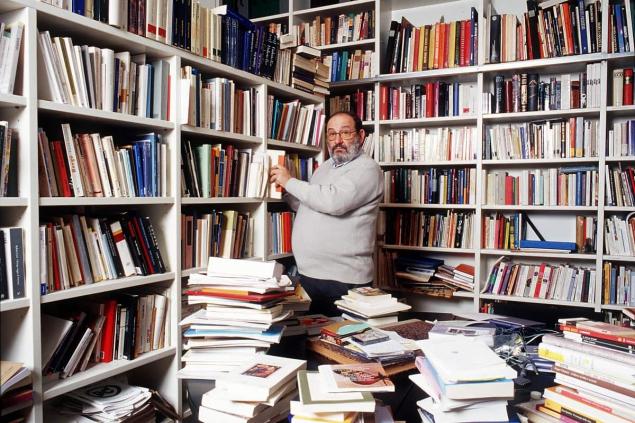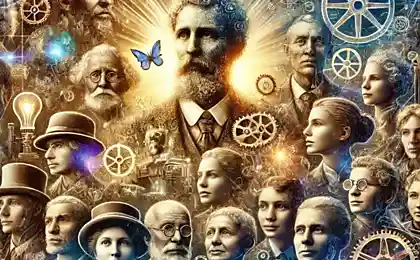151
Why Umberto Eco calls those who constantly take pictures on the phone stupid
“Everywhere I sought peace, and in one place I found it, in a corner with a book.” – Umberto Eco The famous philosopher often reflects on the modern world. He notes that with the advent of new technologies, people become even more detached from reality. What does he see? digital Umberto Eco - Editorial "Site" I will tell you in this article.

GettyImages Digital Generation Having a cool camera on your phone is cool. Modern smartphones can completely replace the camera for amateur photography. In addition, the phone is easier to carry in your pocket or bag, it does not take up much space. Going somewhere, you can take a lot of pictures to remember. No matter where you are, the camera is always at hand.

In addition, with the advent of the Internet, there is more virtual communication. People share photos, videos, put them on their pages in social networks. Now, in fact, anyone can be a media outlet. You just need to capture an event and click “tell on your page”.

“To take videos or photographs only to put on the Internet. More and more people do not think about anything else when they spread information about events. Thus, they are not able to understand what is really happening before their eyes, says Umberto Eco.
Umberto Eco’s contact with the real world says that people like to draw attention to themselves. You need to take a photo so that everyone can see how someone visited Paris, went to a master class, to a lecture or just went for a run. Unfortunately, most people do not do this for their own development. They take a couple of pictures that will show how “well done” they are. There's nothing wrong with that. But it is sad to realize that in the modern world so much is done just for the sake of another like.

Due to the constant desire to photograph everything for memory and put on the Internet, it is difficult for a person to live the moment itself, enjoy it fully. He is distracted by the camera, the phone, and thoughts about how others will perceive this photo. It is like losing contact with the real world. Not in the sense that the person does not notice anything. It just misses the “here” and “now” moment.

I told different audiences how I stopped taking photos in 1960. It happened after one trip to the French cathedrals, when I photographed like crazy. When I got home, I had a bunch of very mediocre pictures in front of me, and I couldn't remember what they showed. I threw away my camera, and on my subsequent trips I remembered only what I saw. And as a physical memory, and even more so for others than for myself, I bought great postcards.”
Umberto Eco’s Mechanical Eye Syndrome refers to this phenomenon as the “memory” syndrome of the mechanical eye. He says that this phenomenon in a sense makes people indifferent to each other. The writer also notes the selfish motives of such an intention.
“In San Leo, during a celebration from the city administration, I prepared to rediscover the landscapes of Montefeltro. But some three young men kept dazzling me with flashes of their cameras. I had to urge them to follow the rules of good manners. It is worth paying attention to the fact that in both cases the “blinders” were not paparazzi, but, presumably, were educated people who voluntarily came to listen to lectures on a certain topic.

Remaining indifferent to the lectures, these people wanted only to capture the event itself. Most likely, to put on the Internet later. They didn’t care what they were talking about. They came only to remember their phones what they had seen with their own eyes.

Perhaps we should all listen to the words of the Italian philosopher. Sometimes we don’t notice how information, the Internet, and technology distract us from real life. You need to learn to capture the moment, to enjoy it. That's the only way to really live. Of course, you can take photos for memory, share them somewhere in social networks. However, this should not be abused, everything must be measuredSo you don't lose yourself.

GettyImages Digital Generation Having a cool camera on your phone is cool. Modern smartphones can completely replace the camera for amateur photography. In addition, the phone is easier to carry in your pocket or bag, it does not take up much space. Going somewhere, you can take a lot of pictures to remember. No matter where you are, the camera is always at hand.

In addition, with the advent of the Internet, there is more virtual communication. People share photos, videos, put them on their pages in social networks. Now, in fact, anyone can be a media outlet. You just need to capture an event and click “tell on your page”.

“To take videos or photographs only to put on the Internet. More and more people do not think about anything else when they spread information about events. Thus, they are not able to understand what is really happening before their eyes, says Umberto Eco.
Umberto Eco’s contact with the real world says that people like to draw attention to themselves. You need to take a photo so that everyone can see how someone visited Paris, went to a master class, to a lecture or just went for a run. Unfortunately, most people do not do this for their own development. They take a couple of pictures that will show how “well done” they are. There's nothing wrong with that. But it is sad to realize that in the modern world so much is done just for the sake of another like.

Due to the constant desire to photograph everything for memory and put on the Internet, it is difficult for a person to live the moment itself, enjoy it fully. He is distracted by the camera, the phone, and thoughts about how others will perceive this photo. It is like losing contact with the real world. Not in the sense that the person does not notice anything. It just misses the “here” and “now” moment.

I told different audiences how I stopped taking photos in 1960. It happened after one trip to the French cathedrals, when I photographed like crazy. When I got home, I had a bunch of very mediocre pictures in front of me, and I couldn't remember what they showed. I threw away my camera, and on my subsequent trips I remembered only what I saw. And as a physical memory, and even more so for others than for myself, I bought great postcards.”
Umberto Eco’s Mechanical Eye Syndrome refers to this phenomenon as the “memory” syndrome of the mechanical eye. He says that this phenomenon in a sense makes people indifferent to each other. The writer also notes the selfish motives of such an intention.
“In San Leo, during a celebration from the city administration, I prepared to rediscover the landscapes of Montefeltro. But some three young men kept dazzling me with flashes of their cameras. I had to urge them to follow the rules of good manners. It is worth paying attention to the fact that in both cases the “blinders” were not paparazzi, but, presumably, were educated people who voluntarily came to listen to lectures on a certain topic.

Remaining indifferent to the lectures, these people wanted only to capture the event itself. Most likely, to put on the Internet later. They didn’t care what they were talking about. They came only to remember their phones what they had seen with their own eyes.

Perhaps we should all listen to the words of the Italian philosopher. Sometimes we don’t notice how information, the Internet, and technology distract us from real life. You need to learn to capture the moment, to enjoy it. That's the only way to really live. Of course, you can take photos for memory, share them somewhere in social networks. However, this should not be abused, everything must be measuredSo you don't lose yourself.
Why they say that daughters-in-law like to count other people's money
Why do they say that a man does not love a woman, but his state next to her?























